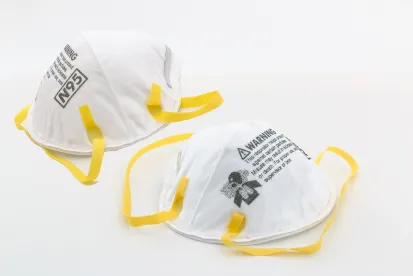3M Company (3M) is a leading manufacturer of N95 respirators. According to 3M, medical workers and public-health professionals consider 3M-branded N95 respirators to be “the gold standard.”
N95 masks are so named because they filter out at least 95% of non-oily airborne particles. Not surprisingly, the COVID-19 pandemic spiked the demand for N95 respirators. 3M ramped up production of its N95 masks as a result, but did not increase the price. Other entities, however, have purportedly offered 3M N95 respirators at prices much higher than 3M’s list prices.
This led 3M to respond to N95 price gouging in a number of ways: (1) offering to work with federal and state governments to combat price gouging, counterfeiting, and fraud; (2) posting its list prices for 3M-brand respirators on its website; (3) creating a website form for customers to report suspected price gouging and counterfeiting; (4) establishing a fraud “hotline” that customers can call to verify purported 3M distributors and to report suspected price gouging and counterfeiting; and (5) responding to complaints.
3M also filed more than a dozen lawsuits against “third parties who use the 3M Marks … to confuse and deceive consumers into believing that they are authorized 3M distributors, vendors, or representatives.” 3M Co. v. Performance Supply, LLC, Case 1:20-cv-02949-LAP, Findings of Fact ¶ 29 (S.D.N.Y. May 4, 2020). In some respects, 3M’s claims embody standard trademark infringement theory: The defendant is using 3M’s marks in a way that confuses consumers into believing that the defendant has a relationship with 3M that does not in fact exist.
But 3M is also asserting trademark infringement claims against “third parties who offer to sell purported 3M-brand N95 respirators for exorbitant prices.” Id. (emphasis added). Essentially, 3M is claiming that a defendant can infringe its 3M mark even by selling actual 3M products, if the defendant’s prices are high enough to harm 3M’s reputation and brand.
This theory of trademark infringement is more novel, and may be in tension with trademark’s “first sale,” or “exhaustion,” doctrine. Under the first sale doctrine, a third party that sells a trademarked product at a price higher than the trademark owner wants is not a trademark infringer, as long as the third party does not suggest a false connection with the trademark owner and the trademarked product remains “genuine,” i.e., product not materially different, warranty not voided, quality control not thwarted.
One recent 3M case demonstrates at least initial success for this trademark-infringement-by-price-gouging theory. In 3M v. Performance Supply, 3M asserted trademark infringement claims based on Performance’s offer to sell New York City’s Procurement Office 7 million 3M N95 respirators at prices 500% to 600% above 3M’s list prices. 3M’s “standard” trademark infringement claims focused on Performance’s extensive use of 3M’s mark in sales documents: “Defendant’s rampant use of the 3M Marks throughout the Formal Quote, combined with the presence of the Plaintiff’s 3M Marks and 3M Slogan in Technical Specification Sheets, caused New York City officials to mistakenly believe that Defendant was an authorized distributor of Plaintiff’s products and/or otherwise had an association or affiliation with Plaintiff and its products.” 3M v. Performance Supply, Complaint ¶ 41 (Apr. 10, 2020). However, 3M also suggested that Performance’s price gouging itself damaged the 3M mark: “The mere association of 3M’s valuable brand with such shameless price-gouging harms the brand.” Id. at ¶ 45.
In granting 3M’s motion for preliminary injunction, the judge found irreparable “damage to 3M’s brand and reputation if it is associated with the crime of price-gouging at the expense of healthcare workers and other first responders in the midst of the COVID-19 crisis,” 3M v. Performance Supply, Conclusions of Law ¶ 7 (May 4, 2020), and preliminarily enjoined Performance from using 3M’s marks in connection with “any goods or services, including . . . Plaintiff’s 3M-brand N95 respirators.” Id., Order on Plaintiff 3M Company’s Application for a Preliminary Injunction against Defendant Performance Supply, LLC ¶ 1.a (May 4, 2020) (emphasis added). Thus, the judge appears to agree that Performance’s price gouging in connection with genuine 3M goods could harm 3M’s brands and potentially constitutes trademark infringement.
Another recent 3M case, however, illustrates possible limitations on a theory of price gouging as a form of trademark infringement. In 3M Co. v. Geftico, LLC, Case No. 6:20-cv-00648-CEM-GJK (M.D. Fla. Apr. 14, 2020), 3M asserted trademark infringement claims against Geftico based on its alleged attempts to sell 3M N95 respirators to the Center for Disease Control at elevated prices. 3M obtained a temporary restraining order and moved for a preliminary injunction. Before the preliminary injunction hearing, however, Geftico filed both a motion to dismiss 3M’s trademark claims and a brief in opposition to 3M’s motion for preliminary injunction. In those pleadings, Geftico cited the first sale doctrine, asserting that “there are no allegations … that the 3M-branded masks for sale by Geftico’s vendors have been altered in any way causing a material difference that would otherwise make the resale actionable,” and asserted that the federal trademark statute does not “provide[] a plaintiff with a civil claim for price gouging.” Id., Defendant’s Motion to Dismiss Plaintiff’s Complaint and Supporting Memorandum of Law ¶¶ 21-22 (May 8, 2020). The case settled before the preliminary injunction hearing.
The varied trajectories of Performance Supply and Geftico may be due in part to differing fact patterns and litigation strategies. Geftico filed substantive defenses, and asserted that it had acted only as a sales agent and hadn’t itself set any exorbitantly high prices for 3M’s N95 masks. In contrast, Performance never appeared in its case. And after entry of the preliminary injunction, 3M advised the judge that Performance’s principal had been charged in a criminal complaint related to the attempted sale of N95 respirators to government agencies at grossly inflated prices.
3M has continued its campaign of filing and pursuing trademark suits against alleged N95 price gougers. It will be instructive to see how 3M’s trademark claims proceed and whether its theory of price gouging as trademark infringement is successful, as it could impact arguments available to other retailers in the future.




 />i
/>i
